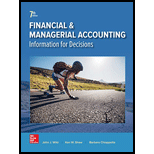
(1)
To compute:
(1)
Explanation of Solution
Given,
Current assets are $86,900
Current liabilities are $24,000
Formula to calculate current ratio is:
Substitute $86,900 for current assets and $24,000 for current liabilities.
Thus current ratio is 3.62.
Working notes:
Calculation of current assets,
Calculation of current liabilities,
(2)
To compute: Acid test ratio of C Corporation.
(2)
Explanation of Solution
Given,
Cash is $10,000.
Short term investments are $8,400.
Accounts receivables are $29,200.
Formula to calculate acid test ratio is,
Substitute $10,000 for cash, $8,400 for short term investments $29,200 for
Thus, acid test ratio is 1.98.
Working notes:
Calculation of current liabilities,
(3)
To compute: Day’s sales uncollected of C Corporation.
(3)
Explanation of Solution
Given,
Accounts receivable is $29,200.
Net sales are $448,600.
Formula to calculate day’s sales uncollected is,
Substitute $29,200 for accounts receivable and $448,600 for net sales.
Thus, day’s sales uncollected are 23.76 days.
(4)
To compute: Inventory turnover of C Corporation.
(4)
Explanation of Solution
Given info,
Cost of goods sold is $297,250.
Inventory in the beginning of the year is $48,900.
Inventory at the end of the year is $32,150
Formula to calculate inventory turnover is,
Substitute $297,500 for cost of goods sold and $48,900 for inventory in the beginning of the year and $32,150 at the end of the year.
Thus, inventory turnover is 7.33.
(5)
To compute: Day’s sales inventory of C Corporation.
(5)
Explanation of Solution
Given info,
Inventory at the end of the year is $32,150
Cost of goods sold is $297,250
Formula to calculate day’s sales in inventory is,
Substitute $297,500 for cost of goods sold and $32,150 for inventory at the end of the year.
Thus, day’s sales inventory is 39.48 days.
(6)
To compute: Debt and equity ratio of C Corporation.
(6)
Explanation of Solution
Given info,
Long term notes payable is $63,400.
Equity is $152,800
Formula to calculate debt and equity ratio is,
Substitute $63,400 for debt and $152,800 for equity.
Thus, debt and equity ratio is 0.41.
Working notes:
Calculation of equity,
(7)
To compute: Time interest earned ratio of C Corporation.
(7)
Explanation of Solution
Given info,
Income before interest and tax is $52,750.
Interest expense is $4,100.
Formula to calculate time interest earned ratio is,
Substitute $52,750 for income before interest and tax and $4,100 for interest expense.
Thus, time interest earned ratio is 12.87.
(8)
To compute: Profit margin ratio of C Corporation.
(8)
Explanation of Solution
Given,
Net income is $29,052.
Net sales are $448,600.
Formula to calculate Profit margin ratio is,
Substitute $29,052 for net income and $448,600 for net sales.
Thus, profit margin ratio is 6.48%.
(9)
To compute: Total assets turnover ratio of C Corporation.
(9)
Explanation of Solution
Given,
Net sales are $448,600.
Assets in the beginning of the year are $189,400.
Assets at the end of the year are $240,200.
Formula to calculate total assets turnover ratio is,
Substitute $448,600 for net sales and $189,400 for assets in the beginning of the year and $240,200 at the end of the year.
Thus, total assets turnover ratio is 2.1.
(10)
To compute: Return on total assets ratio of C Corporation.
(10)
Explanation of Solution
Given,
Net income is $29,052.
Assets in the beginning of the year are $189,400.
Assets at the end of the year are $240,200.
Formula to calculate return on total assets ratio is,
Substitute $29,052 for net income and $189,400 for assets in the beginning of the year and $240,200 at the end of the year.
Thus, return on total assets ratio is 0.14.
(11)
To compute: Return on common
(11)
Explanation of Solution
Given,
Net income is $29,052.
Common stock in the beginning of the year is $90,000.
Common stock at the end of the year is $90,000.
Formula to calculate return on common stockholder’s equity is,
Substitute $29,052 for net income and $90,000 for common stock in the beginning of the year and $90,000 at the end of the year.
Thus, return on common stockholder’s equity is 32.28%.
Want to see more full solutions like this?
Chapter 13 Solutions
Financial and Managerial Accounting

 AccountingAccountingISBN:9781337272094Author:WARREN, Carl S., Reeve, James M., Duchac, Jonathan E.Publisher:Cengage Learning,
AccountingAccountingISBN:9781337272094Author:WARREN, Carl S., Reeve, James M., Duchac, Jonathan E.Publisher:Cengage Learning, Accounting Information SystemsAccountingISBN:9781337619202Author:Hall, James A.Publisher:Cengage Learning,
Accounting Information SystemsAccountingISBN:9781337619202Author:Hall, James A.Publisher:Cengage Learning, Horngren's Cost Accounting: A Managerial Emphasis...AccountingISBN:9780134475585Author:Srikant M. Datar, Madhav V. RajanPublisher:PEARSON
Horngren's Cost Accounting: A Managerial Emphasis...AccountingISBN:9780134475585Author:Srikant M. Datar, Madhav V. RajanPublisher:PEARSON Intermediate AccountingAccountingISBN:9781259722660Author:J. David Spiceland, Mark W. Nelson, Wayne M ThomasPublisher:McGraw-Hill Education
Intermediate AccountingAccountingISBN:9781259722660Author:J. David Spiceland, Mark W. Nelson, Wayne M ThomasPublisher:McGraw-Hill Education Financial and Managerial AccountingAccountingISBN:9781259726705Author:John J Wild, Ken W. Shaw, Barbara Chiappetta Fundamental Accounting PrinciplesPublisher:McGraw-Hill Education
Financial and Managerial AccountingAccountingISBN:9781259726705Author:John J Wild, Ken W. Shaw, Barbara Chiappetta Fundamental Accounting PrinciplesPublisher:McGraw-Hill Education





